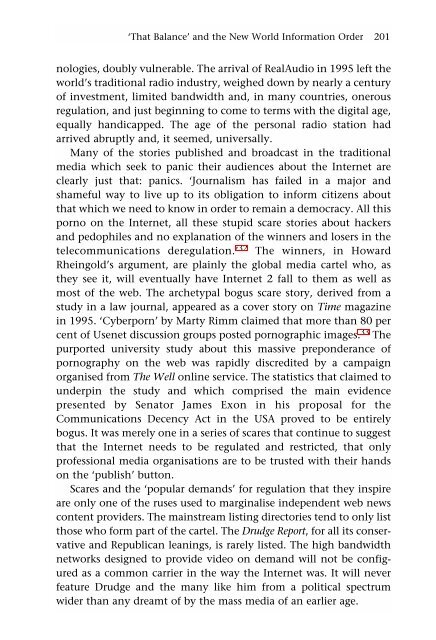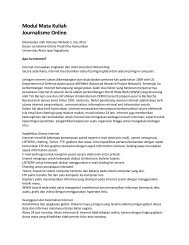Online Journalism - Ayo Menulis FISIP UAJY
Online Journalism - Ayo Menulis FISIP UAJY
Online Journalism - Ayo Menulis FISIP UAJY
Create successful ePaper yourself
Turn your PDF publications into a flip-book with our unique Google optimized e-Paper software.
‘That Balance’ and the New World Information Order 201<br />
nologies, doubly vulnerable. The arrival of RealAudio in 1995 left the<br />
world’s traditional radio industry, weighed down by nearly a century<br />
of investment, limited bandwidth and, in many countries, onerous<br />
regulation, and just beginning to come to terms with the digital age,<br />
equally handicapped. The age of the personal radio station had<br />
arrived abruptly and, it seemed, universally.<br />
Many of the stories published and broadcast in the traditional<br />
media which seek to panic their audiences about the Internet are<br />
clearly just that: panics. ‘<strong>Journalism</strong> has failed in a major and<br />
shameful way to live up to its obligation to inform citizens about<br />
that which we need to know in order to remain a democracy. All this<br />
porno on the Internet, all these stupid scare stories about hackers<br />
and pedophiles and no explanation of the winners and losers in the<br />
telecommunications deregulation.’ 32 The winners, in Howard<br />
Rheingold’s argument, are plainly the global media cartel who, as<br />
they see it, will eventually have Internet 2 fall to them as well as<br />
most of the web. The archetypal bogus scare story, derived from a<br />
study in a law journal, appeared as a cover story on Time magazine<br />
in 1995. ‘Cyberporn’ by Marty Rimm claimed that more than 80 per<br />
cent of Usenet discussion groups posted pornographic images. 33 The<br />
purported university study about this massive preponderance of<br />
pornography on the web was rapidly discredited by a campaign<br />
organised from The Well online service. The statistics that claimed to<br />
underpin the study and which comprised the main evidence<br />
presented by Senator James Exon in his proposal for the<br />
Communications Decency Act in the USA proved to be entirely<br />
bogus. It was merely one in a series of scares that continue to suggest<br />
that the Internet needs to be regulated and restricted, that only<br />
professional media organisations are to be trusted with their hands<br />
on the ‘publish’ button.<br />
Scares and the ‘popular demands’ for regulation that they inspire<br />
are only one of the ruses used to marginalise independent web news<br />
content providers. The mainstream listing directories tend to only list<br />
those who form part of the cartel. The Drudge Report, for all its conservative<br />
and Republican leanings, is rarely listed. The high bandwidth<br />
networks designed to provide video on demand will not be configured<br />
as a common carrier in the way the Internet was. It will never<br />
feature Drudge and the many like him from a political spectrum<br />
wider than any dreamt of by the mass media of an earlier age.
















